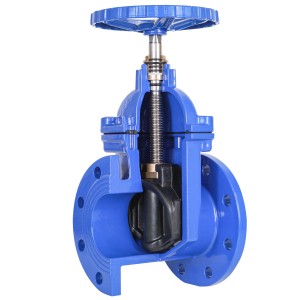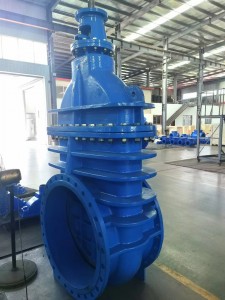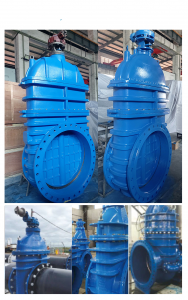Ductile Iron Soft Seal Gate Valve VS. Ductile Iron Hard Seal Gate Valve


Soft seal gate valves and hard seal gate valves are commonly used devices for regulating and intercepting flow, both have good sealing performance, a wide range of use, and are one of the products that customers purchase more. Some purchasing novices may be curious, the same as the gate valve, what is the specific difference between them?
A soft seal is a seal between metal and non-metal, while a hard seal is a seal between metal and metal. Soft seal gate valve and hard seal gate valve are sealing materials, hard seal is precision machined with the seat material to ensure the accuracy of the fit with the spool (ball), usually stainless steel and copper. Soft seal is embedded in the valve seat sealing material is a non-metallic material, due to the soft sealing material has a certain degree of elasticity, and thus the processing precision requirements are relatively lower than the hard seal will be. Below take you to understand the difference between soft seal gate valve and hard seal gate valve.

First sealing materials
1. The two sealing materials are different. Soft seal gate valve is usually rubber or PTFE and other materials. Hard sealing gate valve using stainless steel and other metals.
2. Soft seal: sealing the vice side of the two sides of a metal material, the other side of the elastic non-metallic materials, known as "soft seal". The sealing effect of such gate valves, but not high temperature, easy to wear and tear, and poor mechanical properties. Such as steel + rubber; steel + PTFE and so on.
3. Hard seal: hard sealing and sealing on both sides are metal or other more rigid materials. Such gate valve sealing is poor, but high-temperature resistance, wear resistance, and good mechanical properties. Such as steel + steel; steel + copper; steel + graphite; steel + alloy steel; (can also use cast iron, alloy steel, spray paint alloy, etc.).
Second, the construction process
The mechanical industry has a complex task environment, many of which are ultra-low temperature and low pressure, high media resistance, and corrosive. Now, technological advances have led to the popularization of hard seal gate valves.
To consider the relationship between the metal's hardness, hard seal gate valve, and soft sealing, the valve body needs to be hardened, and the valve plate and valve seat to keep grinding to achieve sealing. The hard seal gate valve production cycle is much longer.
Third, the use of conditions
1, soft seal can realize zero leakage, hard seal can be adjusted according to the requirements of high and low;
2、Soft seals may leak under high temperatures, need to pay attention to fire prevention, and hard seals will not leak under high temperatures. An emergency shut-off valve hard seal can be used in high pressure, the soft seal can not be used.
3, for some corrosive media, the soft seal can not be used, you can use a hard seal;
4, in the ultra-low temperature, soft seal material will have leakage, hard seal is not such a problem;
Fourth, equipment selection on
Both sealing levels can reach six, usually based on the process medium, temperature, and pressure to choose the right gate valve. For general media containing solid particles or abrasive, or when the temperature exceeds 200 degrees, it is best to choose a hard seal. If the torque of the shut-off valve is large, you should choose to use a fixed hard seal gate valve.
Five, the difference in service life
The advantage of the soft seal is good sealing, the disadvantage is that it is easy to aging, wear and tear, short life. Hard sealing service life is longer, and the sealing performance is worse than soft sealing, the two can complement each other.
The above is the difference between soft seal gate valve and hard seal gate valve knowledge sharing, I hope to be able to help you in the procurement work.



